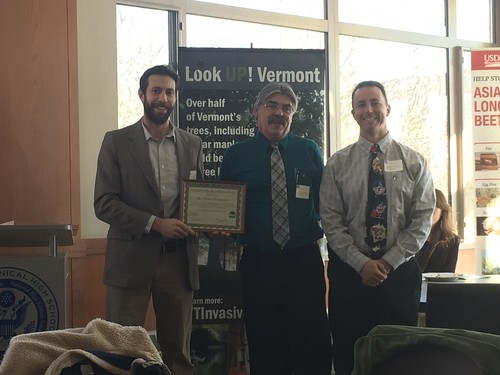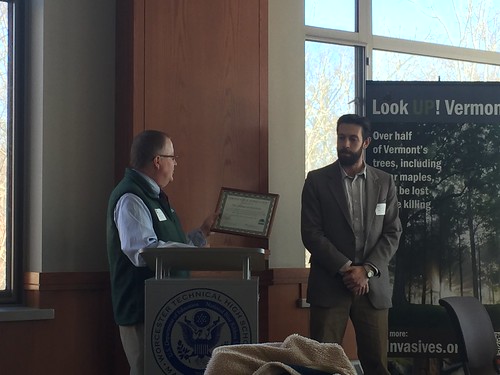
The Vermont maple syrup industry is well aware that an invasive, tree-killing insect could threaten the production of its delicious, all-natural commodity. So on December 13, just four days before National Maple Syrup Day on December 17, the Vermont Maple Sugar Makers Association and Vermont state officials hosted a special pancake and maple syrup breakfast to thank partners for supporting the Asian longhorned beetle (ALB) eradication program in Massachusetts.
Why would people in Vermont make breakfast for their neighbors in Massachusetts? Vermont’s Forest Health Program Manager Barbara Schultz told the group the Asian longhorned beetle poses a significant threat to our northeastern forests and the insect could spread throughout the region and devastate maple sugaring in Vermont if it’s not eradicated in Massachusetts.
Since the beetle was detected in Worcester County, Massachusetts in 2008, communities within the quarantine area have cooperated in the removal of over 35,000 trees. The beetle prefers to attack maple trees the most out of the 12 different types of trees it can develop in and emerge from.
With the maple syrup industry valued at $131 million annually, maple sugar makers are right to want the beetle stopped and eliminated from within the U.S. Attendees included representatives from the cities and towns impacted by the ALB quarantine, the Greater Worcester Land Trust, the Worcester Tree Initiative and state legislators representing Worcester County. Representatives from the USDA, Animal and Plant Health Inspection Service’s ALB Eradication Program staff were available to answer questions and discuss program activities, including the need to be vigilant and report damage during the winter months.
Signs of Asian longhorned beetle devastation include:
- Perfectly round exit holes, about the size of a dime or smaller, in tree trunks and branches.
- Shallow oval or round scars in the bark, where the adult beetle has chewed an egg site.
- Sawdust-like material, called frass, on the ground around the tree or in the branches.
- Dead branches or limbs falling from an otherwise healthy-looking tree.
More information about the Vermont Maple Sugar Makers Association is available on the web at http://vermontmaple.org/. For information about the Vermont Department of Forests, Parks and Recreation, visit http://fpr.vermont.gov/. Learn more about how you can help fight the ALB at APHIS’ website: https://www.aphis.usda.gov/pests-diseases/alb.



